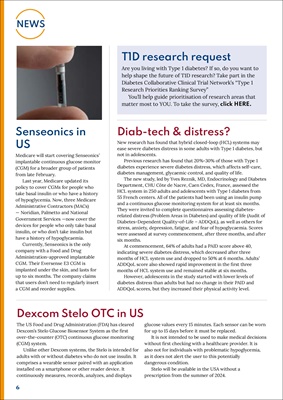
6
NEWS
Senseonics in
US
Medicare will start covering Senseonics'
implantable continuous glucose monitor
(CGM) for a broader group of patients
from late February.
Last year, Medicare updated its
policy to cover CGMs for people who
take basal insulin or who have a history
of hypoglycemia. Now, three Medicare
Administrative Contractors (MACs)
- Noridian, Palmetto and National
Government Services -now cover the
devices for people who only take basal
insulin, or who don't take insulin but
have a history of hypoglycaemia.
Currently, Senseonics is the only
company with a Food and Drug
Administration-approved implantable
CGM. Their Eversense E3 CGM is
implanted under the skin, and lasts for
up to six months. The company claims
that users don't need to regularly insert
a CGM and reorder supplies.
T1D research request
Are you living with Type 1 diabetes? If so, do you want to
help shape the future of T1D research? Take part in the
Diabetes Collaborative Clinical Trial Network's "Type 1
Research Priorities Ranking Survey"
You'll help guide prioritisation of research areas that
matter most to YOU. To take the survey, click HERE.
Diab-tech & distress?
New research has found that hybrid closed-loop (HCL) systems may
ease severe diabetes distress in some adults with Type 1 diabetes, but
not in adolescents.
Previous research has found that 20%-30% of those with Type 1
diabetes experience severe diabetes distress, which affects self-care,
diabetes management, glycaemic control, and quality of life.
The new study, led by Yves Reznik, MD, Endocrinology and Diabetes
Department, CHU Côte de Nacre, Caen Cedex, France, assessed the
HCL system in 250 adults and adolescents with Type 1 diabetes from
55 French centers. All of the patients had been using an insulin pump
and a continuous glucose monitoring system for at least six months.
They were invited to complete questionnaires assessing diabetesrelated
distress (Problem Areas in Diabetes) and quality of life (Audit of
Diabetes-Dependent Quality-of-Life - ADDQoL), as well as others for
stress, anxiety, depression, fatigue, and fear of hypoglycaemia. Scores
were assessed at survey commencement, after three months, and after
six months.
At commencement, 64% of adults had a PAID score above 40,
indicating severe diabetes distress, which decreased after three
months of HCL system use and dropped to 50% at 6 months. Adults'
ADDQoL score also showed rapid improvement in the first three
months of HCL system use and remained stable at six months.
However, adolescents in the study started with lower levels of
diabetes distress than adults but had no change in their PAID and
ADDQoL scores, but they increased their physical activity level.
Dexcom Stelo OTC in US
The US Food and Drug Administration (FDA) has cleared
Dexcom's Stelo Glucose Biosensor System as the first
over-the-counter (OTC) continuous glucose monitoring
(CGM) system.
Unlike other Dexcom systems, the Stelo is intended for
adults with or without diabetes who do not use insulin. It
comprises a wearable sensor paired with an application
installed on a smartphone or other reader device. It
continuously measures, records, analyzes, and displays
glucose values every 15 minutes. Each sensor can be worn
for up to 15 days before it must be replaced.
It is not intended to be used to make medical decisions
without first checking with a healthcare provider. It is
also not for individuals with problematic hypoglycemia,
as it does not alert the user to this potentially
dangerous condition.
Stelo will be available in the USA without a
prescription from the summer of 2024.